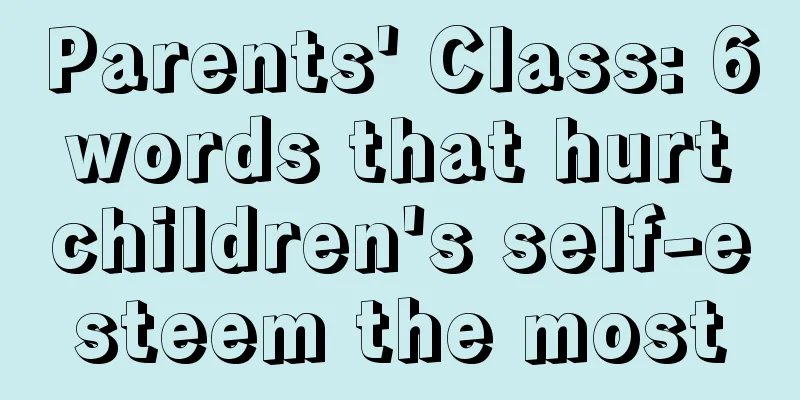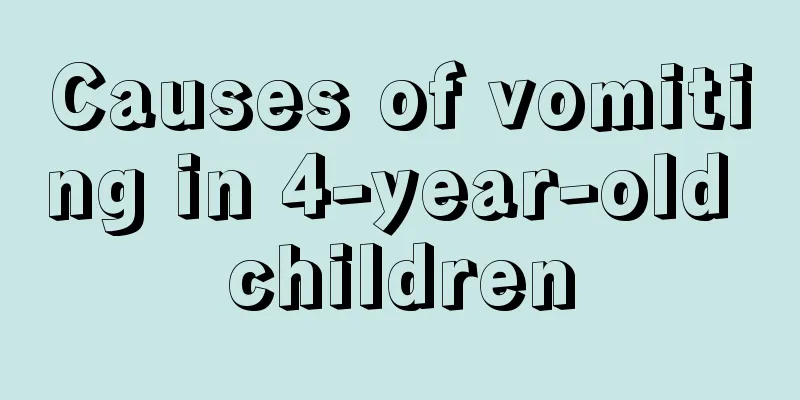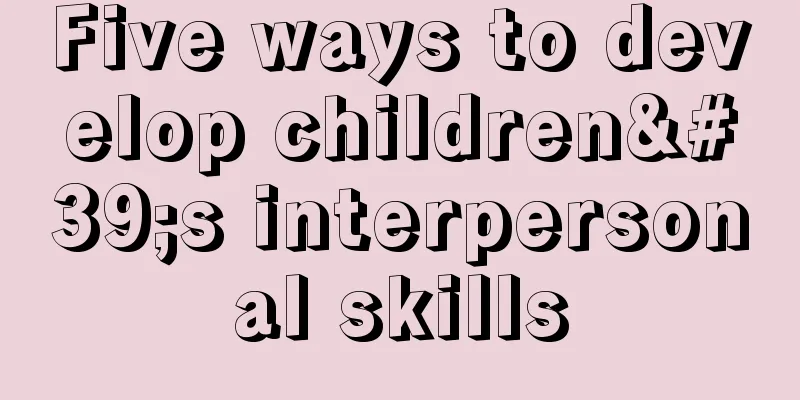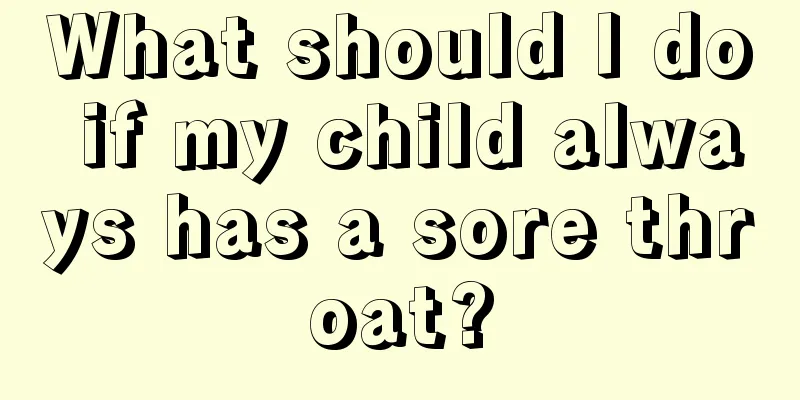Parents' Class: 6 words that hurt children's self-esteem the most

|
Keyword 1: I told you "I told you so" may appear when a child demonstrates his or her ability. When parents say, "I told you you could do it, but you weren't paying attention before," it will make the child feel frustrated. Always comparing the things that the child did not do well in the past has the meaning of bringing up old issues. Although you still affirm his ability, you also think that he could have done things well a long time ago, which is somewhat critical. Therefore, this way of speaking is indeed inappropriate. Children will think that they are not encouraged for the things they have done well, while the things they have not done well are repeatedly mentioned. Another common situation is that parents warn their children many times but they keep making the same mistake again and again, so the parents will say, "I told you not to do that." In fact, parents should also be able to realize that their children are making mistakes repeatedly, intentionally or unintentionally. If they think the child is unintentional, then telling themselves "he was careless" will help reduce their anger a little. When dealing with the mistakes made by the child, you can tell the child seriously and solemnly why he made the mistake despite repeated reminders, and let him practice stating the reasons himself to achieve the effect of correction. If the child makes a mistake intentionally, we need to face the reasons behind his or her behavior, whether he or she wants to get the attention of his or her parents because he or she is ignored in daily life, or whether he or she has physical or mental developmental disabilities.
Keyword 2: No, can’t This situation often happens at home. Many adults will directly tell their children "no" when they think something is bad, but they do not tell the children the reasons behind it. Psychological experts hereby remind all parents that before saying "no", they should first clearly explain why "no" is not allowed. Or you can guide children to discuss and solve problems together in a chatting way, for example, talk to your children in a negotiating tone: "This cartoon will last for 30 minutes, but we will have dinner soon, what should we do?" In addition, you may wish to replace negative prohibitions with positive reminders, such as replacing "no TV" with "we have to eat first." If you always prohibit your children from watching TV, it will only remind them to remember to watch TV, which will make them more interested in the prohibited things.
Keyword 3: Wait a minute After saying "wait a minute" to their children, parents often don't follow up and don't pay attention to the fact that they said this, but the children are full of expectations. Whether it’s “let’s talk about it later,” “I’ll buy it later,” or “I’ll play with you later,” if it is used frequently without any follow-up, this inconsistent way of speaking will make children lose trust. Therefore, when you are busy, you might as well adopt responsive listening, that is, repeat the child’s meaning first, and then indicate that you are busy, such as: "It seems that you like this toy very much! But Mom is busy, I will listen to you later, okay?" This way can make the child feel respected, and he will naturally respect the fact that his mother has things to deal with. However, after you are done, you must remember to do what you promised your child.
Keyword 4: Look at you Parents have the right to express their emotions, but they should be particularly careful about the words they choose, and in many cases they can make slight corrections. Sometimes, parents just unintentionally utter words of patience, with expressions of dissatisfaction on their faces, and the children also know that they have done something to make their parents angry. However, if parents do not further explain the reason for their anger, it will allow their children to belittle themselves. Children aged two or three are just beginning to develop self-esteem, and self-esteem comes from the accumulation of positive experiences. Never criticize or ridicule them casually. If parents cannot suppress their emotions and directly throw emotional words at their children, then the children can only feel the parents' anger and rage, but do not know where they did wrong. Over time, their self-worth will be devalued. Therefore, parents need to calm down the child and deal with the event at that time instead of venting their personal emotions first. In addition, sometimes parents will show impatience with their children because they are upset. Please note that no matter what the reason for your impatience is, as long as you reflect your emotions to your child, you should honestly tell him the reason. If it is simply because you are upset, you should even take the initiative to apologize to the child.
Keyword 5: You must When parents often say "you must" or "you should", they might as well reflect on why they say that. Is it simply giving orders to gain a sense of accomplishment in controlling the child, or is it imposing one's own expectations on the child? If it is indeed one of the above two mentalities, then parents must correct their thinking. Because children are independent individuals, not appendages of their parents. Although control and scolding can produce immediate results, they will also produce the greatest sequelae. Treating children as adults who are about to grow up and making them understand "why we should do this" is the long-term solution. This is more important than simply ordering them "must do" to prevent children from lacking judgment in the future and only knowing how to blindly follow or oppose just for the sake of opposing. It is understandable that parents worry that their children will not know how to put away their toys after playing, so they remind them before anything happens. However, a commanding tone can easily make children feel distrusted, which is the fallacy of "expected failure." Preschool children often anthropomorphize objects, and sometimes using their language can make parent-child interactions and communication more effective. Therefore, change the question and ask your child: "What should you do after playing with toys?", or say in a child's tone: "After playing with toys, you must also take them home!" If you educate your children in this way, they will easily accept the idea of putting away toys.
Keyword 6: Don’t quarrel Psychologist Piaget once said: "Please remember that a child's name is always 'child'." They need time and space to play, and play is just for fun, not for the sake of learning skills. "Playing" is the child's natural duty. Parents must accept the child's need to play, and sounds will naturally be made when playing. Furthermore, children in cities often lack space to move around and have no way to vent their energy, so parents must think carefully about whether their children really lack space to play. If the answer is yes, please plan some time for your child to run and jump outdoors, or arrange a safe and appropriate area at home so that your child can fully vent his or her energy without worrying about being scolded. After having enough time and space to play games, if the child still plays games loudly at home and disturbs others, parents should tell him clearly that he can play games but cannot disturb others. If a child has no channel to expend his energy, but is repeatedly scolded by his parents when he is venting his energy normally, it will only destroy his self-confidence, because he is just playing games but always makes his parents unhappy. |
<<: 7 key points for children to eat rice healthily
>>: Six tips to help your children have a good appetite in summer
Recommend
How to prevent children from getting body odor? These knowledge points must be remembered!
No matter who you are, once body odor occurs, it ...
What is the head circumference of a four month old baby?
When the baby is 4 months old, mothers should not...
What should I pay attention to after my baby gets BCG vaccine?
We all know that BCG vaccine is very effective in...
Baby fright convulsions
Everyone knows that children are particularly sus...
What's wrong with the little boy's nose bleeding?
Nosebleeds should be taken seriously, but we can ...
Why is the child shivering?
Children's tremors, also known as convulsions...
What can parents do to help their children with autism recover?
In recent years, the incidence of autism among ch...
What is the principle of children's spring cough
Spring is the peak season for children to get sic...
What are the recipes for three-year-old babies?
A 3-year-old baby is at an important stage of dev...
What is the cause of the baby's high fever convulsions
It is not uncommon for many infants and young chi...
What should I do if my baby has a runny nose and eye mucus?
The baby accidentally caught a cold and had a run...
What to do if your child has a fever and stuffy nose
Children's fever is accompanied by nasal cong...
How to deal with cold hands and feet after the child's fever subsides
When a child has a serious fever, parents will gi...
What causes stomach pain in children?
In our daily life, we often find children sufferi...
Can the baby take a bath when he has a fever and diarrhea?
When a baby is sick, we rarely let him go out and...









